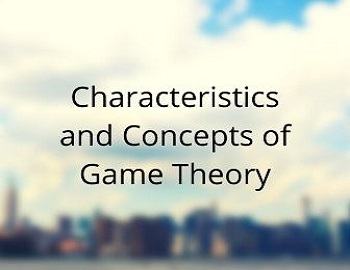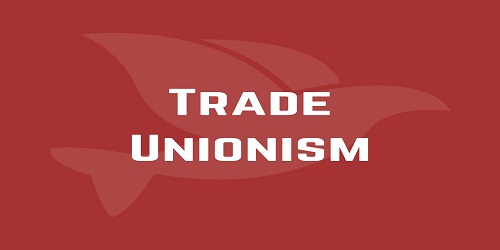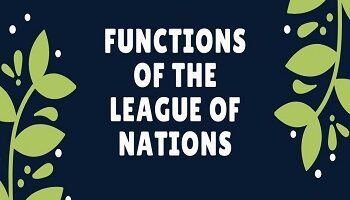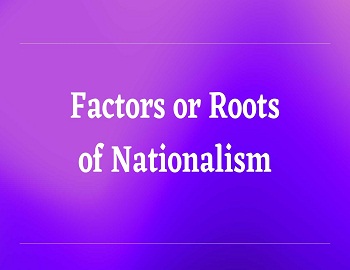Characteristics and Concepts of Game Theory:
Game Theory has some important characteristics. First of all, it is believed that in this game every player or participant is selfish. All try to gain their own ends and objectives. Each player is interested in winning the game and two or more individuals have to make choices and have preferences. While making for a final choice they take into consideration the utility of the choice as well. The participant, may that be individual, group or institution, will always try to behave rationally and reasonably. The second characteristic of the game theory is that every participant or player always tries to take his maximum interests into consideration and makes efforts to achieve them. First of all, he thinks about his gains and advantages. Another characteristic of this theory is that participants in the game will always try to be efficient and accept higher payoff. ‘The game theorist, remarks S.P. Verma, tries to analyse the strategies by which players may maximize their pay-offs, that gets as close as possible to their first preference outcomes’.
Game Theory also has its concepts. We may summarize these as follows-
(1) Players or the Decision-makers- First of all, there are players, the decision-makers or the participants who could be the individuals or institutions.
(2) Rational Behaviour- Another important concept of the theory of game is rational behaviour. Each player is a rational entity with well-defined objectives and has a certain set of resources that help him in combating his opponents with whom he is engaged. In fact, this theory is a theory of rational behaviour; in this way, it attempts to answer the question of what is rational and the best course of action in a particular situation. The rational behaviour suggests that each action should adopt a strategy that will enhance its chances of victory.
(3) Strategy- The term strategy here broadly means the operational plans in accord with which governments manipulate all kinds of instrumentalities non-military as well as military in their efforts to accomplish desired objectives. It assumes that one’s opponents are attempting to injure one in the way that they can do best. In the words of Ralph M. Goldman, strategy is “an overall programme of actions which a player adopts in order to achieve a desired outcome or series of outcomes under adverse or conflict conditions and consists of all the different contingent plans that the player has for deciding along the way how to act next”. The assumption is that the player can design a strategy that covers all possible contingencies.
Martin Shubik says, “A strategy may be viewed as a book of instructions which a player could give to a delegate telling him what to do under all contingencies. It is a general plan of action worked out in complete detail”. He further says, “In politics and other human affairs individuals rarely if ever, are in a position to plan in the detail indicated by a strategy. When a general uses strategy he counts for the major contingencies leaving much of the final detail to be delegated to his subordinates”.
(4) Pay-off Function- The fourth significant and the most important concept in the theory of games is that of pay-off function. To quote S.P. Verma, ‘In man-made games, like chess, bridge or poker, the inventor of the game generally designs a very small range of prospects, limited in numbers and possible combinations, but in real life, it is not possible to observe these limitations. The prospect of each game has a specific outlook or reward for each player. That is described in the game theory as a pay-off. It is important for the elements of the theory because until we know the pay-off function for every combination of strategies of the player or participant, we cannot apply the theory of games. The pay-off function suggests to the player to select the strategy which over the long run will net him the most regardless of what his opponent does.
(5) Rules of the Game- The fifth concept is the rules of the game which describes mainly how the resources are to be utilized. In the words of S.P. Verma, ‘Rules in ordinary games indicate some established understanding or verbal statement prescribing the acceptable conduct on the part of the players, but rules in game theory are different- they are laid down by those who are powerful enough to apply them and, therefore, greater attention is paid to the resource implication of rules rather than to their prescriptive requirements. A rule of the game, therefore, can be defined as the distribution of resources and strategic possibilities open to each player in the employment of these resources.
(6) Outcome- Another concept of the game theory is the ‘outcome’. It is the objective the players wish to achieve. There can be possibly three outcomes- namely, win, lose or draw. But in other games, there could be many outcomes that could be defined as prospects.
(7) Alliances- The next concept of the theory of game is alliances or coalition. It suggests that when the third player in the game is introduced, new coalitions or alliances are to be formed. The distribution of gains among the players of the coalition creates a problem. Because players will unite in a manner to get more gains and if any member could not get more gains that he could get in another coalition, he will leave the coalition, bringing loss to the other members in the coalition.
(8) Solution- The last concept of this theory is the solution that is required in such situations.
While applying the theory of games to particular phenomena of coalition formation. Gamson, in his book “Theory of Coalition Formulation”, has suggested the following assumptions-
- The actors can be ranked resources (votes), position or by some other characteristic.
- The actors have the same information about the initial distribution of resources and the pay-off for any coalition.
- All coalition strategies are equally difficult or costly.
- No actor can be eliminated from the group or added to the group, and no actor has veto power.
- Each actor will expect the other actors to demand a share of the pay off proportional to amount of resources which each has contributed to the coalition.
- The chooser will seek a minimal winning colaition which is characterized by maximum advantage or minimum disadvantage of strength relative to his colaition partner.
- The chooser will seek a minimal winning coalition which is characterizedc by the fact that the defection of any number will make the coalition no longer winning.
- The pay-off matrix is in the zero-sum form i.e., no single alternative will maximize the pay-off to all participants and the decision to be made involves more than two numbers attempting to maximize their pay-off.
- The decision rule is a simple majority.









Comments (No)